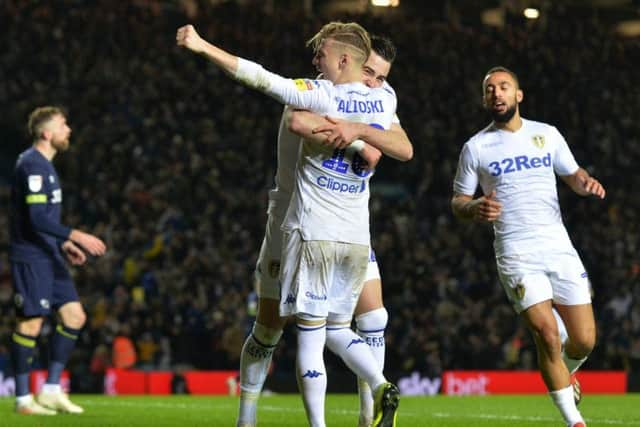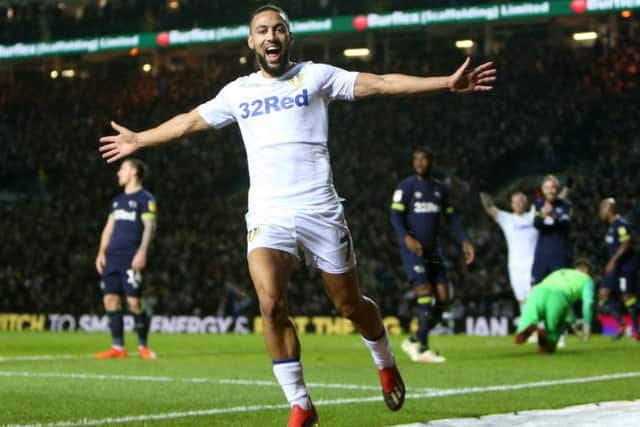The Spygate debate: Our writers give their verdict on the controversy between Leeds United and Derby County


You can read the full story on what caused the row here. Below two of our writers give their views on the subject that has split footballing opinion - what are your thoughts? Let us know in the comment section at the bottom of the page.
Phil Hay says...
Leeds United’s training ground is no open house. It has fences around its perimeter, trees and bushes shielding the pitches and security staff manning the gate. An aerial view would be needed to capture anything the club were trying to hide.


Advertisement
Hide AdAdvertisement
Hide AdThe design of Thorp Arch was not accidental and nor is it unique. English clubs try to keep their day-to-day work private, to guard their intentions and stop the public seeing things like Samuel Saiz lagging a mile behind in the first week of pre-season sprints. It is the club’s turf and their domain, with very limited access.
That Derby County’s sessions are visible from an open road (although not for much longer, surely) is besides the point. England treats training grounds as sacrosanct and by those standards Marcelo Bielsa was guilty of bad etiquette by dispatching a scout to peer through Derby’s fence.
It is, to coin the quote of the weekend, not how we do things in this country, although football in this country has a sanctimonious habit of painting itself as the game’s moral compass.
Bielsa, having been publicly challenged, is well advised to cease and desist and Leeds’ apology to Derby on Saturday morning, 12 hours after Bielsa insisted he would not be saying sorry to Frank Lampard, answers the question of whether their head coach can keep up the practice of watching opposition players train at close quarters.


Advertisement
Hide AdAdvertisement
Hide AdThe unnamed staff member who was caught with binoculars and pliers – Chaka Demus, as somebody dubbed him – must have questioned the tactic himself as he sat in the back of a police van on Thursday.
Bielsa’s conviction about the clash of cultures which occurred was shown by his refusal to skirt responsibility. There were enough staff under him at Leeds for Bielsa to claim some sort of plausible deniability or to throw someone further down the chain under the bus but he did not class covert scouting as inappropriate beforehand and the scrutiny he faced on Friday evening did little to change his tune.
What Bielsa saw was a situation where South American standards fell foul of English standards; an apparently common practice in his old stamping ground causing upset in a country where he had never worked before.
He has a friend and an ally in Mauricio Pochettino, a former player of his and a fellow Argentinian, so Pochettino’s opinion might not be wholly neutral but the Tottenham boss struggled to understand the fuss when it was put to him last week. “It’s not a big deal,” Pochettino said. “It happened in Argentina.”


Advertisement
Hide AdAdvertisement
Hide AdLampard scoffed at the talk of a cultural collision but that is the truth of the matter. Bielsa recalled on Friday how he ran public training sessions from his first day to his last at Athletic Bilbao; every session in public for the duration of his tenure as head coach. They were not open with the express intention of inviting opposition scouts to watch but because Bielsa was never in the habit of training in private.
England is different and in the past few days, he has learned precisely how different England is. He has little choice but to relent and conform, to act in good faith as England defines it.
If he sticks around for long enough, England might show itself to be hypocritical. One way or another, the game here usually does.
And so to the talk of punishment of him. Are official sanctions against Bielsa and Leeds really necessary or is a rebuke from his club and a weekend of national admonishment enough? Thursday was a lesson learned for Bielsa, even if the uproar baffled him, and the Football Association would be judging him by the highest standards of discipline if it refused to accept that Bielsa’s crossing a line is at least partly down to Bielsa crossing borders.


Advertisement
Hide AdAdvertisement
Hide AdManagers try not to walk into a hail of bullets. Had he known how heavily the saga would drop on him, he would not have taken responsibility so readily.
His remark that the scouting trip gave him no “added advantage” over Lampard sounded like a contradiction. In that case, what was the point of it? But then Leeds wiped the floor with Derby – wiped the floor with Derby for the second time this season – and the idea that their dramatic improvement under Bielsa owed much to snooping around opposition camps was given the right perspective.
Gains like that would be marginal over 46 matches. Leeds’ transformation in the past six months has been too vast to owe anything to the trade secrets of anyone other their head coach. Bielsa has taken a hit for spying on Lampard. In light of an immense performance which was almost lost in the controversy, perhaps it was Lampard who should have been snooping on him.
Joe Urquhart says...
Since Marcelo Bielsa’s arrival to English football I cannot think of another manager who has spoken with quite as much honesty and integrity as the Argentine.
Advertisement
Hide AdAdvertisement
Hide AdLeeds United said over the weekend that they would remind the 63-year-old of those two words after one of his staff was caught watching Derby County train on Thursday morning from behind a fence on public land.
To many, Bielsa had broken an unwritten rule of football in this country and one pundit even suggested he had “broken the moral code” of the game.
Ah, yes. The outrage. A reminder that this rule is so unwritten that it fails to appear in either of the FA or EFL’s handbooks. A loophole if you will.
Is it unsporting behaviour? Probably. But then again isn’t diving? And what about a player gesturing to the referee for a yellow card to be brandished? Or pulling an opposition shirt from a corner kick. We could go on.
Let’s talk about the morals of football for a minute.
Advertisement
Hide AdAdvertisement
Hide AdOn Friday evening both teams had the same betting company blazoned across the front of their shirts. Earlier that day it was revealed by The Guardian that the relentless involvement of betting companies within the game was leading to serious issues with gambling addictions for men between the ages of 18-35.
Ah, yes. Morals.
Yet 17 out of 24 Championship clubs are sponsored by a betting company in some form. And then what about the rise of agent fees? And the illegal tapping up of young players? What about the FA moving fixtures of their flagship competition due to greed? Or Manchester City’s owners close links to a country with human rights abuses?
Ah, yes. Morals.
In 2014/15 Bournemouth were promoted to the Premier League, an achievement that earned manager Eddie Howe plaudits from all corners of the footballing community for taking his ‘plucky’ Cherries into England’s elite.
Yet, one quick scan of their accounts shows they broke Financial Fair Play directly due to expenditure on transfers and playing staff wages.
Advertisement
Hide AdAdvertisement
Hide AdI would hazard a guess that peeking over a fence doesn’t quite have the same effect on a team’s performance – a fine of £4.75m was the punishment three years on from enjoying the riches the Premier League has to offer.
You guessed it... morals.
“It’s not just a toe over the line. It’s a hop, skip and a jump over the line,” said Frank Lampard of the incident. He also added that he would rather not coach than spy on opposing teams. Well then. Let’s talk about Chelsea too.
Former scout Andre Villas-Boas openly admitted in 2011 that he would often be sent to opposition training grounds “incognito” by boss Jose Mourinho.
Chuck those Premier League medals in the bin, Frank.
The reaction to ‘spygate’ has been nothing short of extreme by some, whilst others have been more understanding, but football in this country has an obsession with painting itself as whiter than white.
Advertisement
Hide AdAdvertisement
Hide AdThere is nothing saintly about sending a coach to spy on an opposition team a day before a game but let’s not pretend this is the first (or last) time this will ever happen.
This behaviour from Bielsa, if anything, is indicative of his personality and approach to the game; he leaves nothing to chance.
That is not a justification but more of an understanding.
We are talking about a man who has grass cut to a certain length, who is known to sleep in his office on a regular basis and travels to the likes of Crewe Alexandra on a random Monday afternoon to watch his Under-23s side rather than just press play on a video tape 24 hours later.
It is possible to think he overstepped the mark whilst also believing that the reaction from the wider world has been filled with hypocrisy.
Advertisement
Hide AdAdvertisement
Hide AdWhether peering into a training session offers a slender advantage or not the gap between the two sides on Friday evening was clear for all to see.
A fine would suffice, maybe even a touchline ban for Bielsa if they are really looking to make an example of him, but should the powers that be enforce a points deduction for a rule that seemingly doesn't exist? No chance.
If anything, and just how Leeds United like it, the incident has created another “us against the world” mentality at Elland Road and history tells us football should be put on alert.